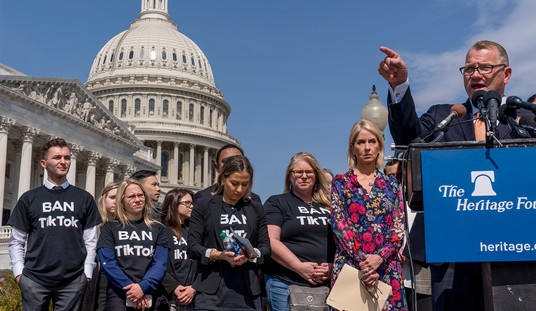Three months ago, Congress put aside the Obama request for a new authorization for the use of military force (AUMF) to fight ISIS in Iraq and Syria, even while the White House struggled to decide exactly how to do that. The effort got stopped by Obama’s own party, who worried that the restrictions on action didn’t go far enough, while Republicans and the Pentagon shrugged it off as unnecessary, and perhaps worse, as Sen. Orrin Hatch argued at the time. The restrictions on action the proposal from the White House included served more to alert the enemy to our own hesitancy to fight, now and in the future:
“And here we have the president coming up with this — I think it’s utterly stupid — proposal,” Hatch told KSL News Radio. “And he’s binding the next president also with really stupid language.” …
Hatch said ISIS could use the restrictions in the proposal to its advantage.
“Why would we not only unilaterally impose limitations as to which types of tools and tactics our service members can use then also broadcast these limitations to the enemy?” he said.
“If we’re telling the Islamic State upfront that we will not using ground forces, will they not tailor their strategy around that fact? Tell me!” he said.
“If we advertise when the authorization expires with the arbitrary date and time, won’t they just hunker down and wait for that date?”
Hatch, whose voice raised several times during the interview, apologized for getting worked up. “I mean, i’m really up in arms about it.”
A few months later, a few people on Capitol Hill want to revive the debate over the AUMF. Greg Sargent reports that a new proposal from Tim Kaine and Jeff Flake may soon make the rounds:
When we last checked in on the whole question of whether Congress would ever vote to authorize the war against ISIS, things looked pretty hopeless. Senator Bob Corker — the chairman of the Foreign Relations Committee who was thought to be the key to negotiating an Authorization for the Use of Military Force that both parties might support — had essentially slammed the door on any such vote, deriding it as an “intellectual exercise.”
It now appears, however, that the prospects for a vote are not quite dead yet. Dem Senator Tim Kaine and GOP Senator Jeff Flake have just rolled out a new AUMF that looks like it could serve as a genuine starting point for discussions. That is, if Congress is inclined to take it that way.
Of course, more than eight months have passed since the escalation against ISIS began, and more than three months have passed since Obama offered his own proposed AUMF (which many liberals and Dems thought was too broad and too vague, even as many Republicans thought it was too limiting). So this whole saga has long since devolved into something irredeemably ridiculous. As I’ve argued, however, there are still reasons to have this debate. …
Thus, the new AUMF offered by Kaine and Flake contains one major improvement over Obama’s proposal: it specifies that the 2001 AUMF authorizing force against the perpetrators of September 11th attacks is not the basis for authorization of the current conflict. That’s important, because Obama’s original claim of authority based on that 2001 AUMF — which was absurd on its face — would have essentially rendered any new AUMF worthless.
How was that claim absurd? The 2001 AUMF specified that the President was authorized to use military force against al-Qaeda and its affiliates as part of a broad war on terror, not limited to Afghanistan. For those who don’t recall, the statute text reads:
- (a) IN GENERAL- That the President is authorized to use all necessary and appropriate force against those nations, organizations, or persons he determines planned, authorized, committed, or aided the terrorist attacks that occurred on September 11, 2001, or harbored such organizations or persons, in order to prevent any future acts of international terrorism against the United States by such nations, organizations or persons.
The group now known as ISIS has more than one connection to al-Qaeda, including an explicit affiliation acknowledged by “core al-Qaeda” several years ago. It started in Afghanistan in 1999 as Jama’at al-Tawhid wal-Jihad by Abu Musab al-Zarqawi, with encouragement and some resources from Osama bin Laden himself. Zarqawi later shifted the group to Iraq in order to launch attacks on Jordan’s monarchy but shifted its focus to the US after the invasion and occupation. He also publicly pledged allegiance to al-Qaeda and changed the name of the organization to al-Qaeda in Iraq, accepting the authority of bin Laden who also accepted Zarqawi’s profession of loyalty, although later there were considerable tensions over the application of that authority. The Anbar Awakening and the surge nearly defeated AQI, but it bounced back in its present form thanks to the poor discipline of the post-US Iraqi army and the sectarian strife in Iraq.
The Christian Science Monitor noted the Zarqawi-bin Laden alliance in December 2004 and its regional significance, in what now looks like prophecy:
For bin Laden, the advantages of the alliance are clear, says Mr. Gunaratna. The operational capabilities of Al Qaeda have been relentlessly trimmed back by the US since the attacks on Sept. 11, 2001, but he and most of his ideological core remain free.
Since the Iraq invasion, bin Laden has repeatedly called Iraq a battleground against the “crusader” West, even as Zarqawi has emerged as his principal agent. Zarqawi has positioned himself at the head of a growing network that US officials believe has been behind more than 70 car-bombings inside Iraq and “now makes him the de facto operational head of the Al Qaeda movement, not the Al Qaeda group, worldwide,” says Gunaratna.
Zarqawi and his fighters were the target of the US siege on Fallujah last month. But US officials say they suspect many of the militants escaped Fallujah to other Sunni cities such as Mosul, which has been the scene of recent insurgent attacks.
By combining their resources, Zarqawi and Al Qaeda seem to be aiming to further amplify their message of total war against the US, the Middle Eastern regimes it favors, and Israel, with an expanded Internet reach and ongoing attacks against US and Iraqi forces.
It took Zarqawi’s forces 11 years to accomplish this, but that’s exactly what they have done, only without Zarqawi.
The nature of the group and its aims have not changed. To suddenly declare that the 2001 AUMF doesn’t apply to what had been for years the most effective operational arm of AQ simply because they changed their name is the absurdity. Congress certainly has the power to repeal the 2001 AUMF, but that would end the authorization for fighting in Afghanistan and conducting drone attacks on other AQ affiliates, such as those in Yemen and North Africa. Congress would then need to pass another AUMF to cover those operations as well as the fight against ISIS, which would be politically difficult if not impossible.
The 2002 AUMF also makes most of this effort unnecessary. That authorization allows the President to use military force to “defend the national security of the United States against the continuing threat posed by Iraq,” a threat that ISIS embodies in large parts of western Iraq. It doesn’t authorize military force in Syria, though, which Congress would arguably have to separately authorize — if Obama was inclined to put troops there. Even that fight would be covered by the 2001 AUMF (fighting against AQ) as long as it didn’t entail fighting Bashar al-Assad’s army.
The purpose of the White House’s push for a new AUMF isn’t to allow them to fight ISIS. It’s to have Congress buy into the limited response to ISIS that Obama has employed. He wants restrictions not just on his options but the next President’s as well, as political cover for a war strategy that’s not only clearly failing but is still half-baked after a full year. Obama can pursue that strategy and much more under current authorizations, but that leaves him vulnerable to accusations of incompetence.
This fight is aided by Democrats who fear what a Republican President might decide to do under current authorizations, which is why we’re discussing new AUMFs at all. Don’t forget that Obama hardly considered an AUMF necessary for Libya, and didn’t even bother with Congress after the 60 day limit of the War Powers Act.
This AUMF debate suffers all the same defects of the previous debate. Congress certainly has the authority to revoke one or both AUMFs and pass replacements if they wish, but it’s hardly necessary — which is why it won’t happen this time, either.
Update: I forgot to define AUMF in the opening paragraph, which I have updated.








Join the conversation as a VIP Member